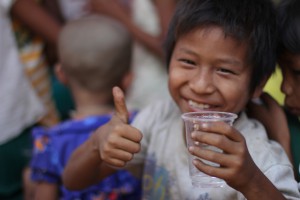Water and sanitation

The right to social security enshrined under Article 9 of the International Covenant on Economic, Social and Cultural Rights encompasses the right to access and maintain social security or other benefits in order to be able to secure water and sanitation (among other necessary goods) and to realise the rights of children and adult dependents (CESCR, General Comment 19 para f18). More recently, the 2010 United Nations General Assembly adopted Resolution 64/292 recognizing the right to safe and clean drinking water and sanitation as a human right that is essential for the full enjoyment of life and all human rights.
Monitoring Water and Sanitation to Reduce Inequalities in Kenya
The 2015 adoption of the 2030 Agenda for Sustainable Development and the Sustainable Development Goals (SDGs) and Goal 61 in particular means that countries must deliberately devise inclusive and effective strategies to measure and evaluate progress on effective access to services such as safe drinking water and sanitation as part of actions to develop holistic […]
Poor Access to WASH: a barrier for women in the workplace
On 19 November, we mark World Toilet Day and highlight the staggering fact that 2.4 billion people – one third of the world’s population – still live without access to proper sanitation. What does this mean for women in the workplace? Poor access to water, sanitation and hygiene (WASH) persists despite the United Nations General […]
Drinking Water, Sanitation and Hygiene in Schools: Global baseline report 2018
The World Health Organization (WHO) and the United Nations Children’s Fund (UNICEF) are responsible for monitoring global progress towards water, sanitation and hygiene (WASH) related Sustainable Development Goal (SDG) targets. The global effort to achieve sanitation and water for all by 2030 is extending beyond the household to include institutional settings, such as schools, healthcare facilities […]
Water and sanitation, migration and the 2030 Agenda for Sustainable Development
Key Messages Migration isn’t driven by a lack of water and sanitation services, but providing services can support successful migration. The barriers faced by migrants make achieving the SDGs’ ambitions of universal access more challenging. Challenges stem from failures in governance, not the amount of water available, numbers of migrants or rates of migration. The […]
Sanitation and Social Protection: a human rights-based approach
This Issue Brief introduces readers to the human rights-based approach to sanitation. Access to sanitation may reduce vulnerability, a key focus of social protection. This briefing paper makes the case for an increased focus on sanitation as a human right, explores current approaches to address this right, and provides ideas on the key directions needed […]
Thirsting for a Future: Water and children in a changing climate
Climate change is one of many forces contributing to an unfolding water crisis. In the coming years, the demand for water will increase as food production grows, populations grow and move, industries develop and consumption increases. This can lead to water stress, as increasing demand and use of water strain available supplies. One of the […]
Towards Gender Equality through Sanitation Access
This discussion paper reviews the extensive literature on sanitation to show that inadequate access to this basic service prevents the realization of a range of human rights and of gender equality. We recognize that “dignity” is a highly culture- and gender-specific term; we therefore argue that sanitation for all—sanitation that serves all genders equally—must be […]
Sanitation Law and Policy in India
Most comprehensive work on sanitation in India. Provides an overview of the existing legal as well as policy instruments related to sanitation in India. Fills the existing gap, both in knowledge and policy instruments, defining sanitation in India. Highlights the importance, complexity, and fragmented nature of the legal and policy frameworks that inform the sanitation […]
Gender Disparities in Water, Sanitation and Global Health
Celebrating World Water Day, The Lancet Editors1 highlighted the gains made towards Millennium Development Goal (MDG) 7c, “to halve, by 2015, the proportion of the population without sustainable access to safe drinking water and basic sanitation”, and noted UN-Water’s call for sustainable water management in view of future increases in demand and shortfalls in supply. […]

